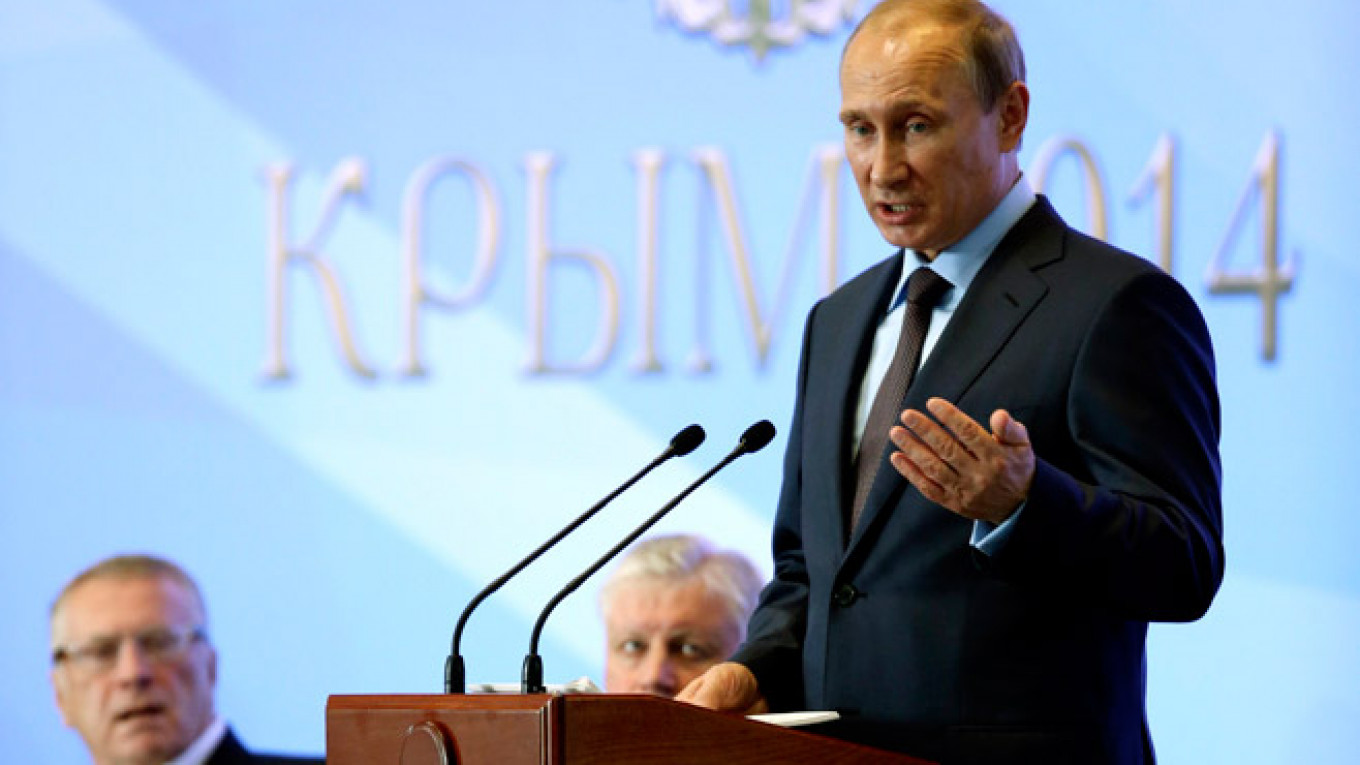Against a backdrop of saber-rattling statements made by leaders of State Duma factions, President Vladimir Putin delivered a reconciliatory speech Thursday in the Crimean coastal town of Yalta, arguing against excessive confrontation with the West.
"We must calmly and effectively build up our country with dignity, not fence it off from the outside world," Putin was cited by Reuters as saying. "We need to consolidate and mobilize: not for war or any kind of confrontation, [but] for hard work in the name of Russia."
Putin stopped short from announcing any of the decisions that were widely expected by pundits and even hinted at by the Kremlin's spokesman Tuesday. At the same time, in stark contrast to speeches made by Duma lawmakers Thursday, Putin's pacifying tone clearly stood out, marking a possible change in Russia's stance in the ongoing confrontation with the West over Ukraine.
Analysts suggested that ahead of Friday's scheduled meeting with Finnish President Sauli Niinisto in Sochi, Putin wants to demonstrate that he is ready to compromise if his position is heard.
"This a signal to the West that Putin is more reasonable and liberal than most members of the Russian elite and public," said Alexei Makarkin, deputy director of the Moscow-based Center for Political Technologies think tank. "The idea is to show Western countries that it would be better to make a deal with Putin than to topple him and deal with warmongers in the Russian elite," he said.
In an unusual diversion from standard practice, the speech was not broadcast on television or online, and no full transcript of the address had appeared on the Kremlin's website by the time of publication.
"All our partners must understand that Russia, as a large sovereign state, has different ways and means to ensure its national interests, including armed forces," Putin said, Reuters reported. "But this is not a panacea and we do not intend, like some people, to dash around the world with a razor blade and wave that blade around."
Unleash the Hounds
During the meeting, organized in newly annexed Crimea, leaders of Duma factions lashed out furiously at the West and Ukraine, advocating outright military conflict.
Vladimir Zhirinovsky, the notoriously fire-and-brimstone leader of the LDPR, proposed reviving the Russian Empire, replacing Russia's flag with the imperial one, introducing a minister of propaganda and renaming the office of president "supreme commander."
"Elections are worthless, they are a profanation," Zhirinovsky told the audience of elected lawmakers.
Putin responded by saying that Zhirinovsky's arguments do not always reflect Russia's official position, but that he always "gets the party going."
According to Makarkin, the reason that some of the most rabble-rousing Duma deputies were allowed to speak at the event was to demonstrate that Putin is Russia's "sole European" — a reference to the aphorism of Russian poet Alexander Pushkin, who referred to the Russian government as the country's sole European — and someone who has enough authority and is shrewd enough to control Russia's nationalist zeal.
Personae Non Gratae
The event may have been aimed at demonstrating the unity of the country's elite regarding the annexation of Crimea and Ukraine crisis, but not all Duma deputies were invited to participate.
"I simply did not get an invitation, while my colleague Ilya Ponomaryov was actually asked not to go," Dmitry Gudkov, a deputy known for his oppositional stance who was recently expelled from the Just Russia party, told The Moscow Times.
Ponomaryov was the only lawmaker to vote against the motion to annex Crimea from Ukraine back in March, while Gudkov did not vote and has publicly voiced opposition to the move.
"I don't understand what the point of this event [in Yalta on Thursday] was, it looked like another kowtow session. Putin was four hours late, and that made it look very Soviet," Gudkov said in a phone interview.
Soviet Union Meets Russian Empire
According to independent analyst Pavel Svyatenkov, the form of the event was more important than its content.
"This was a symbolic demonstration of the country's unity over Crimea and Ukraine policies. Otherwise there would have been no need to bring all this crowd there," he said.
Putin's speech demonstrated that Russia's policy would be "soft Sovietization under the banners of imperial Russia," according to Svyatenkov. In Crimea, Putin is attempting to blend policies of national and religious reconciliation with patriotism, and has adopted the role of the ultimate arbiter of this process, according to the analyst.
Putin echoed these sentiments in his speech, saying: "Crimea can play a unique role in uniting Russia, it can become a source of historical reconciliation of Red and White forces, so that we may heal the wounds that were inflicted on our people by the dramatic schism of the 20th century."
See also:
Crimean Boost For Putin's Ratings Expected to Fade by Year's End
Contact the author at i.nechepurenko@imedia.ru
A Message from The Moscow Times:
Dear readers,
We are facing unprecedented challenges. Russia's Prosecutor General's Office has designated The Moscow Times as an "undesirable" organization, criminalizing our work and putting our staff at risk of prosecution. This follows our earlier unjust labeling as a "foreign agent."
These actions are direct attempts to silence independent journalism in Russia. The authorities claim our work "discredits the decisions of the Russian leadership." We see things differently: we strive to provide accurate, unbiased reporting on Russia.
We, the journalists of The Moscow Times, refuse to be silenced. But to continue our work, we need your help.
Your support, no matter how small, makes a world of difference. If you can, please support us monthly starting from just $2. It's quick to set up, and every contribution makes a significant impact.
By supporting The Moscow Times, you're defending open, independent journalism in the face of repression. Thank you for standing with us.
Remind me later.






